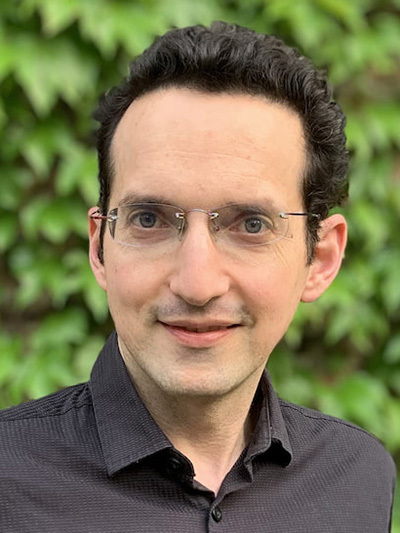Grammy Awards spotlight Notre Dame music faculty
At the 66th Grammy Awards on Sunday (Feb. 4), two faculty members in the University of Notre Dame’s Department of Music will wait to hear if their project names are called.
Daniel Schlosberg, a professor of the practice for piano, is a nominee for best classical solo vocal album, and Stephen Lancaster, an associate professor of the practice for voice, is part of an ensemble nominated for best choral performance.

The event will be a homecoming for Los Angeles native Schlosberg — who is being recognized for his work as a pianist on “40@40,” an art-song collaboration with soprano Laura Strickling. The album is the first installment of 20 pieces of a 40-song vision featuring the work of composers who are diverse in age, background and location.
“The idea was to have a lot of different voices to foster this sense of community that Laura and I both feel is essential to the genre,” said Schlosberg, who is also director of undergraduate studies for the department.
Schlosberg concentrates his research on art song, which he describes as “two artistic mediums coming together to create this hybrid form that is greater than the sum of its parts.” The genre combines poetry and musical composition to create new interpretations of both works.
He also focuses on instrumental contemporary music that is non-vocal and plays chamber music with various performers such as the Chicago Symphony Orchestra.
Schlosberg started playing piano at age 4 and describes the role of music throughout his life as “a very heightened experience.”
“It’s a way of commenting on the way we’re feeling, what’s going on in society, and many, many things,” he said. “It expresses ideas and emotions that are hard to express, complicated, or abstract.”
When he performs, he hopes audience members are emotionally provoked.
“In particular with the art-song genre — text and music — I want them to see how composers navigate and interpret the text they’ve been working with and the subtlety and intricacy that is involved,” Schlosberg said. “And I want them to be excited about art song and explore it further with other artists, composers and time periods.”

When the gilded gramophones are handed out on Feb. 4, Lancaster will be anxiously awaiting the announcement of the best choral performance award. Conductor Craig Hella Johnson is nominated for the album “House of Belonging,” performed by the large vocal ensemble Conspirare, which Lancaster joined in 2020.
The vocal ensemble won a Grammy in 2015 and has been nominated 11 times. For this album, the group rehearsed for several days and performed a live concert before making the recording.
“The more we rehearsed it, the more we loved the repertoire. And then the recording process went really well,” Lancaster said. “So, I think we all felt a sense of excitement that this was a satisfying project with music we felt strongly about. The music and poetry convey powerful messages about belonging that are meaningful to people today.”
Lancaster, who is a fellow with the Nanovic Institute for European Studies, performs both as a soloist and as part of ensembles, primarily focusing on Western classical contemporary and sacred music.
Other notable Notre Dame connections to the Grammy Awards include music faculty member Alexander Blachly, whose vocal group Pomerium was nominated for best small ensemble performance in 1999; Folk Choir director J.J. Wright, whose album “The Caribbean Jazz Project, Afro-Bop Alliance” won a Latin Grammy for best Latin jazz album in 2008; and Sacred Music at Notre Dame technology and production coordinator Daniel Stein, who was a principal player in the album “Canto América,” which was nominated for best Latin jazz album in 2017.
“It’s a major distinction for the department to receive this recognition,” said Berthold Hoeckner, the Keough-Hesburgh Professor of Music History and department chair. “As a department, we are committed to supporting and fostering creative work. These honors speak to the manner in which our faculty are leading the way in innovative and groundbreaking programming.”
Originally published by at al.nd.edu.
Latest Faculty & Staff
- There’s no ‘one size fits all’ when it comes to addressing men’s health issues globallyAt a time when health resources are at a premium and need to be wisely allocated, health professionals must find points within men’s lives when it makes the most sense to intervene and advocate for preventive care for promoting better health outcomes. Life transitions such as marriage and fatherhood are often pivotal and crucial intervention points. But just like every man is different, health concerns across global communities differ as well. Research from the University of Notre Dame finds that not all life transitions produce the same health results, and not all men’s global health policies should look the same from one country to another.
- Three Notre Dame faculty named 2024 Guggenheim FellowsBarbara Montero, a professor of philosophy; Gretchen Reydams-Schils, a professor in the Program of Liberal Studies; and Roy Scranton, an associate professor of English and director of the Creative Writing Program and the Environmental Humanities Initiative, are among the 188 scholars, scientists and artists chosen from approximately 3,000 applicants for the fellowship. The Guggenheim Foundation awards these fellowships to outstanding scholars in order to add to the educational, literary, artistic and scientific power of the country.
- Essays on democracy draw attention to critical threats, explore safeguards ahead of Jan. 6Shortly after Jan. 6, 2021, when a mob stormed the U.S. Capitol building, Notre Dame’s Rooney Center for the Study of American Democracy established the January 6th, 2025, Project, which includes 10 Notre Dame faculty who are preeminent scholars of democracy. In an effort to understand the social, political, psychological and demographic factors that led to that troublesome day, the group created a collection of 14 essays aimed at drawing attention to the vulnerabilities in our democratic system and the threats building against it, hoping to create consensus on ways to remedy both problems.
- Carter Snead testifies before US Senate Judiciary CommitteeO. Carter Snead, the Charles E. Rice Professor of Law and director of the de Nicola Center for Ethics and Culture at the University of Notre Dame, offered expert testimony on Wednesday (March 20) before the U.S. Senate Committee on the Judiciary on the current legal landscape following the landmark Supreme Court decision in Dobbs v. Jackson Women’s Health Organization.
- In memoriam: Ronald Weber, American studies professor emeritusRonald Weber, a professor emeritus of American studies at the University of Notre Dame, died March 12 in Valparaiso, Indiana. He was 89.
- Political scientist shares China-Global South expertise with policymakersFor more than a decade, China has invested heavily in the economic development of countries collectively known as the Global South. More recently, China has demonstrated that its ambitions are growing beyond the economic realm and extending into the geopolitical sphere. This shift carries implications not only for the developing countries that are the beneficiaries of China’s investment, but also for the United States and other developed democracies, says Joshua Eisenman, associate professor of politics in the Keough School of Global Affairs.













